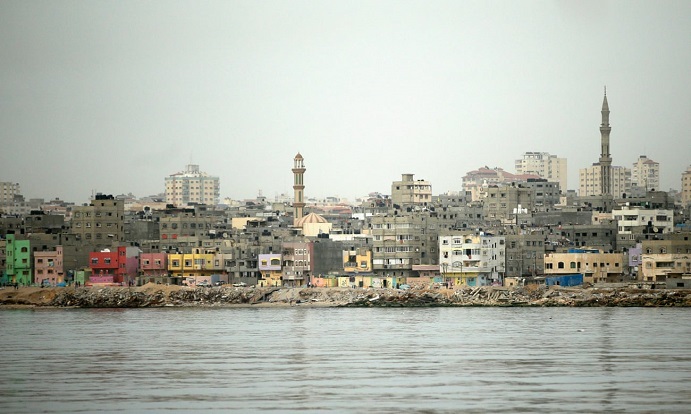A new anthology collects 12 authors’ visions of life in the region in 2048 – providing a liberating change for some
The Guardian / July 25, 2019
Twelve acclaimed Palestinian writers have imagined what their country might look like in 2048, 100 years after the Nakba saw more than 700,000 people expelled from their homes, in what is believed to be the first ever collection of science fiction from the occupied territories.
Stories in Palestine + 100 range from Majd Kayyal’s depiction of a futuristic solution to the Arab-Israeli conflict, in which two parallel worlds occupy the same geographic space, to Saleem Haddad’s Matrix-like concept of a “right to digital return”. Man Booker International prize nominee Mazen Maarouf’s story, meanwhile, is set in the aftermath of a nanobot attack in 2037, narrated by the last Palestinian left alive, his body so affected by radiation that he is kept in a glass box, but who cannot be killed.
Basma Ghalayini, the editor of the collection, writes in her introduction that science fiction has never been particularly popular for Palestinian authors, because “it is a luxury, to which Palestinians haven’t felt they can afford to escape”.
“The cruel present (and the traumatic past) have too firm a grip on Palestinian writers’ imaginations for fanciful ventures into possible futures,” she writes. “Not that the disguise of science fiction would be that drastic a costume change for Palestinian writers, especially those based in Palestine. Everyday life, for them, is a kind of a dystopia. A West Bank Palestinian need only record their journey to work, or talk back to an IDF soldier at a checkpoint, or forget to carry their ID card, or simply look out of their car window at the walls, weaponry and barbed wire plastering the landscape, to know what a modern, totalitarian occupation is – something people in the west can only begin to understand through the language of dystopia.”
Haddad, whose story Song of the Birds is written in memory of the writer Mohanned Younis, who killed himself in 2017, agrees. “As Arab writers we’re not often asked to write about the future, we’re sort of expected to present a very current reality of things on the ground,” he says. “But I think Palestine is such a rich canvas for science fiction, all these themes we deal with as Palestinians … questions of the past and the present and ideas of memories and alternative realities, what might have been.”
He found writing his story “a liberating way to explore current problems” – as did Selma Dabbagh, whose story Sleep It Off, Dr Schott imagines a world where the ethnic make-up of residents is calculated to determine their status. In the story, Schott, who is “45% Ashkenazi and 4.5% Sephardi”, laments: “The last time I felt this low was in ’34 when the final DNA test came through saying I was categorically an under-50 Percenter and these maniacs on social media accused my mother of sleeping with a goy.”
“I’ve never written science fiction, I’ve never tried to look into the future,” Dabbagh says. “It opened up a whole world. At the moment I think the situation in Palestine is so difficult to handle as a fiction writer. It feels so hopeless that I’ve been going back into the past more to find a little bit more light, and this has given me a new avenue, writing at a point in time when things could be on some level a little better.”
She says writing about the future meant she could “extrapolate the insanity of the situation at the moment”.
“Everything in that area that was former Palestine is determined by how Jewish you’re considered to be. That was a great entry point to consider how absurd and arbitrary are the laws that divide people, and to have a love story, a way of showing how love equalises [two people] who otherwise would have been divided by … their blood,” she says.
Palestine + 100 is published by Comma Press, which previously released Iraq +100, a collection on the country in 2103 (a century after the invasion), which was named one of The Guardian’s best science fiction books of 2016. “[Sci-fi] gives space for the writers to talk about the present and the past without any of the stress of having to be censored,” says Ghalayini. “Palestinian writers feel like they always need to write about the current situation, or the Nakba. If they go anywhere out of that, they feel they’re betraying their sense of duty to the cause. And more recently, Palestinians who voice any opinion about the situation are being interpreted as being antisemitic, so that makes people very nervous to write about their situation. This gives them that space to go for it.”
Alison Flood is the Guardian’s books reporter and the former news editor of the Bookseller.













